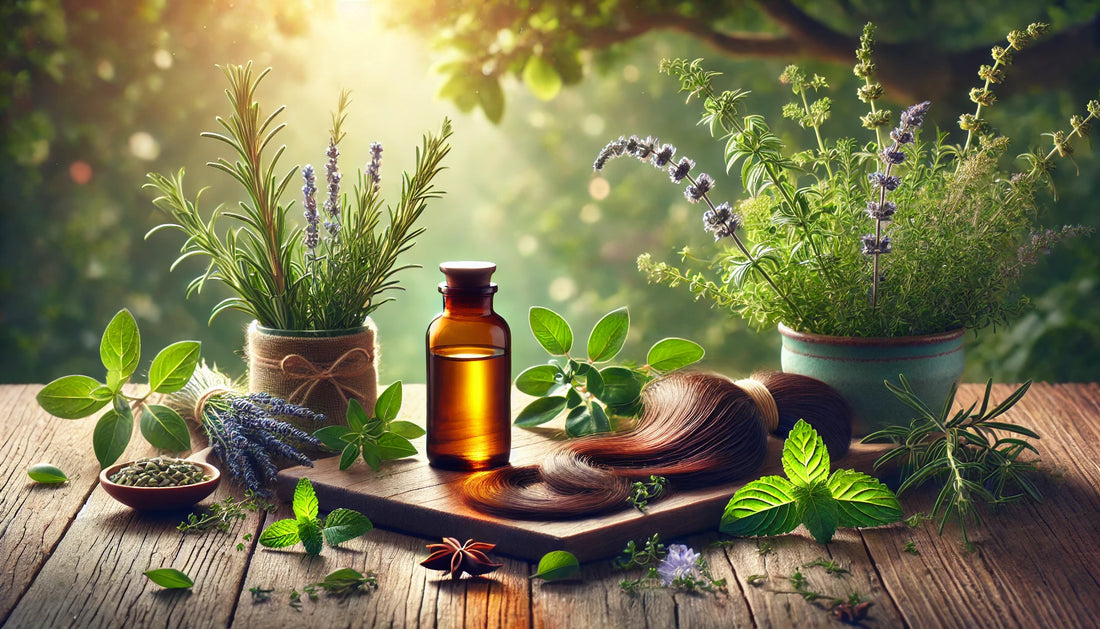Rosemary water has gained popularity in recent years for its ability to promote hair growth, improve scalp health, and even enhance memory. While rosemary water offers many benefits, the world of Ayurveda provides a treasure trove of alternative herbs and plant-based remedies that can offer similar or even more comprehensive health benefits. If you're looking to explore Ayurvedic alternatives to rosemary water, you’re in the right place. Let's dive into some powerful Ayurvedic herbs that can provide holistic benefits for both hair and overall health.
1. Bhringraj (Eclipta Alba)
Known as the "King of Herbs" for hair care, Bhringraj is one of the most revered herbs in Ayurveda for promoting hair health. It helps to nourish hair follicles, strengthen roots, and prevent premature graying.
- Benefits: Bhringraj is known for its ability to improve blood circulation to the scalp, which in turn encourages healthy hair growth. It also helps soothe the scalp, reducing dandruff and itchiness.
- Usage: Make a Bhringraj water rinse by boiling dried Bhringraj leaves in water and letting it cool. Rinse your hair with this infused water after shampooing. Alternatively, you can use Bhringraj oil for scalp massage.
2. Amla (Indian Gooseberry)
Amla is another powerhouse in Ayurvedic hair care and general wellness. Rich in Vitamin C and antioxidants, Amla has been used for centuries to boost hair strength and shine.
- Benefits: Regular use of Amla can help prevent hair loss, enhance natural shine, and reduce premature graying. It also promotes overall scalp health by maintaining its pH balance.
- Usage: Prepare Amla water by soaking dried Amla pieces or powder in water overnight. Use this infused water to rinse your hair after washing. You can also mix Amla powder with other herbs like Shikakai for a nourishing hair mask.
3. Neem (Azadirachta Indica)
Neem is known for its potent antibacterial and antifungal properties. It is particularly beneficial for those dealing with scalp issues like dandruff, itching, or infection.
- Benefits: Neem helps maintain scalp health by controlling oil production and keeping the scalp clean and free from infections. Its anti-inflammatory properties can also reduce scalp irritation.
- Usage: To make a Neem water rinse, boil a handful of Neem leaves in water until the water turns green. Allow it to cool and use it as a final rinse after washing your hair. Neem oil is another great option for a pre-shampoo treatment.
4. Shikakai (Acacia Concinna)
Shikakai, meaning "fruit for hair," is a natural cleanser and conditioner that has been used in Ayurveda for centuries. It is gentle and helps retain the natural oils of the hair.
- Benefits: Shikakai helps in detangling hair, adding shine, and preventing dandruff. It’s known for its mild cleansing properties that do not strip the scalp of its natural oils.
- Usage: Make Shikakai water by soaking the dried pods in water overnight. The next day, boil the mixture, strain, and use the liquid as a hair rinse. Shikakai powder can also be used to create a gentle hair wash.
5. Fenugreek (Methi) Seeds
Fenugreek is a versatile herb that is often used in both culinary and medicinal contexts. It is rich in protein and nicotinic acid, which are beneficial for hair growth and strengthening hair shafts.
- Benefits: Fenugreek seeds help in reducing hair fall, treating dandruff, and promoting a healthy scalp environment for hair growth. The mucilaginous nature of fenugreek also provides a natural conditioning effect.
- Usage: Soak fenugreek seeds overnight and grind them into a paste. You can use the paste directly on your scalp or strain the mixture to use the infused water as a hair rinse.
6. Tulsi (Holy Basil)
Tulsi is a sacred herb in Ayurveda and is revered for its multifaceted healing properties. It is particularly beneficial for maintaining scalp health and balancing oil production.
- Benefits: Tulsi helps in rejuvenating the scalp by increasing blood circulation and has anti-fungal and anti-bacterial properties that prevent scalp infections.
- Usage: Prepare Tulsi water by boiling fresh or dried Tulsi leaves in water. After it cools, use the water as a final rinse after shampooing. Tulsi oil can also be massaged into the scalp for enhanced benefits.
7. Hibiscus (Hibiscus Rosa-Sinensis)
Hibiscus is a vibrant flowering plant that offers a natural solution for hair care. It is known for its ability to add shine and volume to hair.
- Benefits: Hibiscus helps prevent hair loss, conditions the hair, and is an effective remedy for dandruff. It also helps to boost hair growth by nourishing the scalp.
- Usage: Boil Hibiscus petals in water and use the strained water as a hair rinse. Hibiscus powder mixed with water can also be used as a hair mask for deep conditioning.
Conclusion: Embrace Ayurvedic Wisdom for Holistic Hair Care
While rosemary water is a great option for those looking to enhance their hair care routine, Ayurvedic herbs like Bhringraj, Amla, Neem, Shikakai, Fenugreek, Tulsi, and Hibiscus offer a broader spectrum of benefits. Not only do these herbs promote healthy hair growth, but they also provide a holistic approach to overall wellness. By incorporating these Ayurvedic alternatives into your hair care routine, you can nourish your hair and scalp naturally, balancing both health and beauty from within.
Give these alternatives a try and see which one resonates best with you. Ayurveda teaches us that nature provides us with everything we need for a healthy, balanced life. So why not tap into this ancient wisdom and discover a new path to vibrant, healthy hair?
